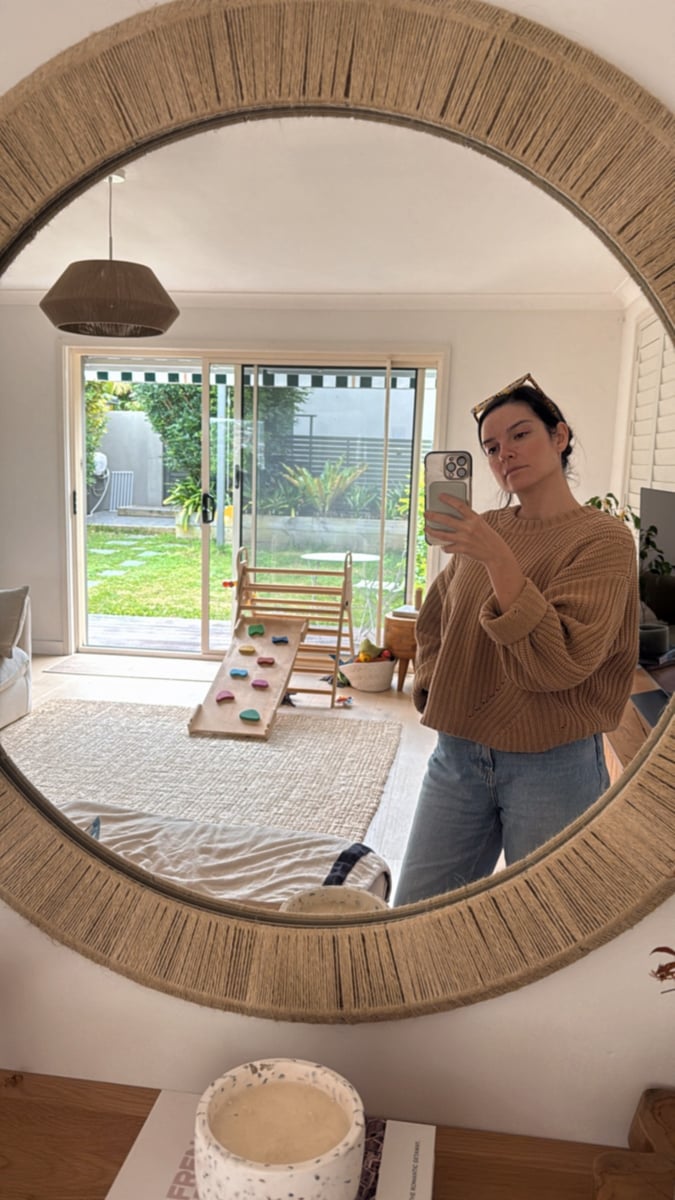
As the kind of person who expects my house to look like nobody lives in it 99 per cent of the time, adjusting to the chaos of motherhood was quite a shock for me. I grew up in a home that resembled a perfectly styled showroom (even though I was one of four kids) and still to this day, no matter how hard I try, I can't silence my mother's voice in my head when a cushion is out of place.
If a friend drops by and my house isn't immaculate, I'm mortified. Logically, I know I shouldn't be (I would never judge another mum for a messy kitchen counter) but the pressure to perform perfection in motherhood is relentless. So, you can imagine my horror when I shared a TikTok video of my home at its messiest to make a point, and it went viral. 2.6 million views later and my shame was global.
I would never have even wanted my friends to see my house like that, let alone a bunch of strangers. But here we were. The video was inspired by a moment earlier that week when my husband, exhausted after work, but trying to be helpful, looked at me and asked, "What do you want me to do to help?"
I knew he meant well. We'd had countless conversations about how overwhelmed I felt since returning to work. But in that moment, I didn't want to tell him what needed doing. I wanted him to see it. I wanted him to just know.
@ashbg.motherhood “CAN YOU JUST WRITE ME A LIST?” Do you not have eyes sir? #marriage #relationshiphumour #mentalload #husbandandwife #motherhood #parenthood #wife #mumtok #momtok ♬ LABOUR - the cacophony - Paris Paloma
A few days later, as the mess piled up, I felt inspired to capture my thoughts and turn them into content — so, I filmed our chaos with text overlaid: "It would be easier if you just told me what needed to be done."
The response was both immediate and heartbreaking. Thousands of comments poured in, with women around the world echoing the same frustrations:
"I guess we all married the same man."
"Why are they all like this?"
In many ways, it was cathartic knowing other women felt the same way. But at the same time, it was also a depressing reminder that women are carrying the burden of the majority of domestic labour all around the world — while their partners look up from their phones occasionally and ask what they can do to "help."
And then came the other replies:
"Why would you marry someone like this?"
"This is your fault for tolerating it."
And the bluntest of all, various forms of "Leave him."
Suddenly, I was being told to divorce my husband over a 15-second clip shared with zero context, and it made me wonder: Are we not allowed to complain about our partners unless we're planning to leave?
I would go as far as to say that there is a universal truth in the fact that venting to other mums is like chicken soup for the soul. When a friend complains about her husband, she's not necessarily asking for an exit strategy.
She's asking to be heard, to be understood, to know she's not alone.
Watch: WELL | Physical and Mental Changes of Motherhood. Post continues below.
Of course, there are situations where leaving is the right choice, where there is abuse, neglect, or a genuine unwillingness to change. But most of the time, what women need isn't an ultimatum. It's solidarity. It's the reassurance that their frustration is valid, that their exhaustion isn't a personal failing and that their marriage isn't doomed just because they're struggling.
The truth is, motherhood is hard. Marriage is hard. And when the two collide under the weight of unequal labour, it's no surprise that resentment starts to fester. But telling a woman to "just leave" ignores the complexity of her life, the love she has for her partner, the financial realities of modern parenthood, and the inequity of the mental load. The one thing that actually helps in these situations is knowing that you're not alone.
That's why, when you share a vulnerable moment, the best thing that someone can do is share something equally vulnerable.
When I first started my TikTok account earlier this year, I set out to document the sweet, messy chaos of first-time motherhood. The milestones, sleepless nights, the occasional mum win. What I didn't expect was how often my content would turn toward the inequalities in my marriage, the mental load and the quiet frustrations so many of us carry.
Because here's the truth: I hit the marriage jackpot. My husband is my rock, my teammate and the one person who makes parenthood feel less lonely. The kind of partner who shows up, day after day, with love and intention. A hands-on father who changes nappies without being asked, who handles the laundry single-handedly and with enthusiasm, who makes me coffee before I even realise I need it.
But no one is immune to the invisible forces that shape modern motherhood, not even him. And when I dared to name that tension, the response was instant and electric. Not because our marriage is flawed, but because the system is.
 "The truth is, motherhood is hard," writes Ashley Brooks-Garrett. Image: Supplied.
"The truth is, motherhood is hard," writes Ashley Brooks-Garrett. Image: Supplied.
Every time I shared even the smallest moment of struggle from the mental exhaustion of being the default parent, or the frustration of having to delegate tasks that should just be seen, women flooded the comments with "YES," "THIS," "I FEEL THIS IN MY BONES."
It wasn't just validation; it was a rallying cry. It felt like a chorus of mothers saying, "We're here too. We're tired too."
And in those moments, I realised this wasn't just about him, or even me, it was about all mums, everywhere. So I kept showing up, kept sharing, because if my honesty made even one woman feel less alone, then it mattered.
Weaponised incompetence isn't about genuine inability, or even laziness, it's more about avoidance. It's the sigh of "I don't know how you like the dishwasher loaded," so you stop asking. It's the "You're just better at settling the baby," so night duty becomes yours. It's the "Just tell me what to do," so the mental burden never shifts.
It's not always malicious. Often, it's subconscious and a product of societal conditioning that teaches men to help rather than share. But the result is the same: exhaustion, resentment, and the slow erosion of partnership.
Recent studies confirm what most mothers already know. Women do an extra 21 hours of unpaid labour per week compared to men, one in three mothers reports their partner contributes less than 30 per cent of childcare and, perhaps most damningly, 62 per cent of mothers say they feel "constantly overwhelmed" by the mental load.
Even in "good" marriages, there is still so much work to be done.
So where to now?
First, we talk about it openly, without shame. We normalise the frustration, the exhaustion, the sheer unfairness of it all. We push back against the idea that motherhood should be effortless, that a "good" wife does it all without complaint.
Second, we demand real partnership. Not "help," but equal responsibility.
Not "Can I do anything?" but "I've got this." It starts with uncomfortable conversations with partners, with friends, even with ourselves, about what true equity looks like.
And finally, we seek out others with similar experiences that remind us we're not alone. Feminist motherhood isn't about perfection; it's about honesty. It's about rejecting the myth of the "natural" mother who never struggles, never resents, and never burns out.
For those looking for solidarity, here are some of my favourite resources that remind me I'm not alone, and it's not my fault:
Zawn Villines' Feminist Mothering, a space for raw, unflinching discussions about motherhood and equality.
MomLife Comics, where the chaos of parenting is turned into relatable, laugh-through-the-tears art.
Paige Turner's Instagram, a refreshing take on modern motherhood and mental load.
Motherhood shouldn't be this hard. But until the world catches up, we have each other, and that's a start.
Feature Image: Supplied.





























































































